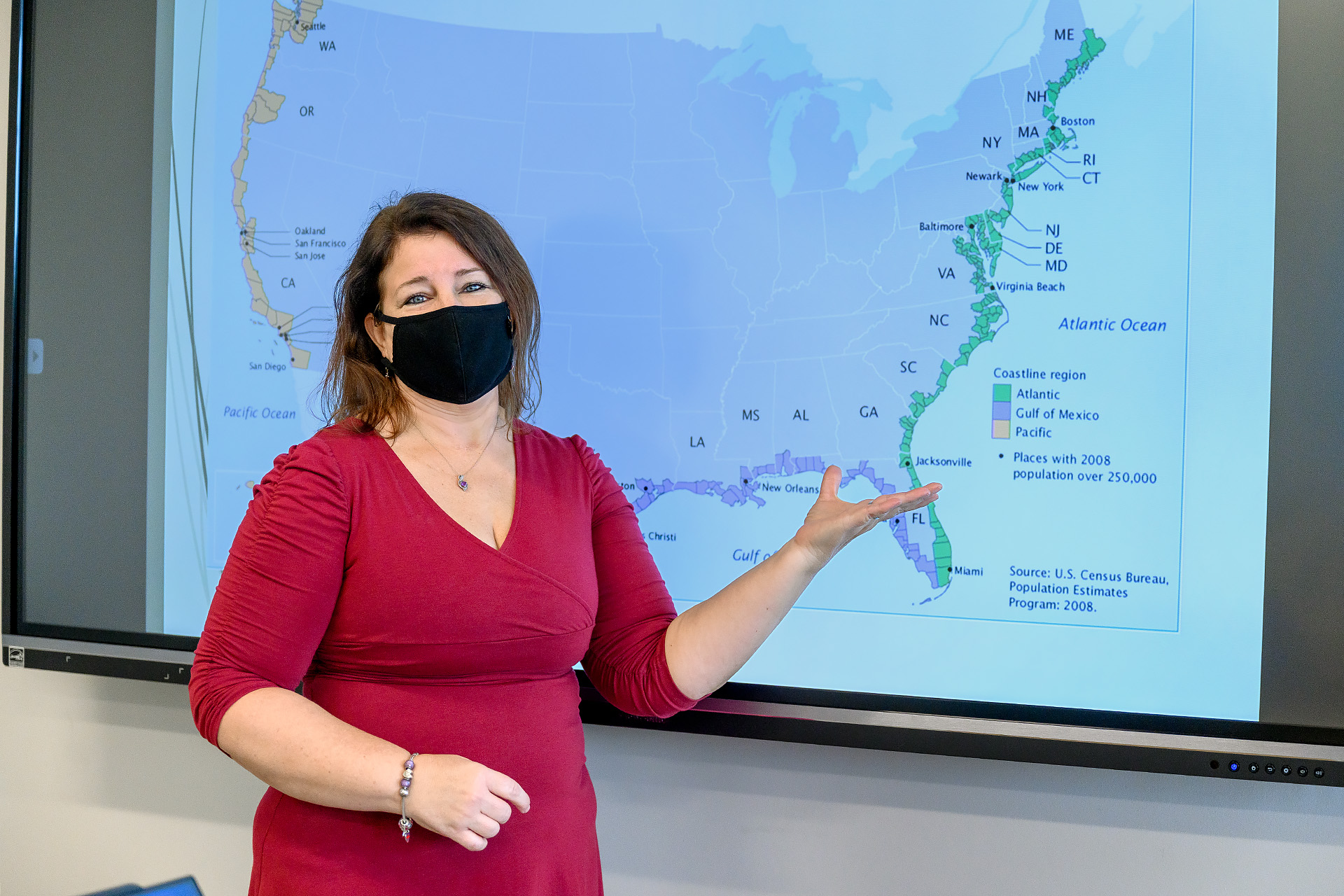For Elizabeth Wright, helping her students succeed during the COVID-19 pandemic is all about communication and compassion. The associate professor of criminal justice administration puts a great emphasis on being responsive to students’ fears.
She has come to realize that putting narration on the PowerPoints for her senior-level Research Methods with Computer Technology class, for example, helps students who are auditory learners comprehend the material more thoroughly. The addition of audio creates a similar feel to an in-classroom lecture although it’s online.
“I’ve also created PowerPoints that have all the assignments in there,” Wright said. “I go through a little bit more of a narrative … One of my students who had taken a previous version of the course from me, but failed, wrote and said, ‘These narrated PowerPoints are really helping. It makes me understand everything a lot better.’”
Wright says she appreciates the angst her Research Methods students feel because she needed additional help in learning about crime statistics.
“Statistics did not come easy to me,” Wright said. “Just running an analysis or looking at an Excel spreadsheet or anything like that didn’t click for me unless I had somebody talking me through it.”

Elizabeth Quinn Wright, Behavioral and Health Sciences, Criminal Justice at the Academics Classroom Building. (Photo: J. Intintoli)
She said students might not know how essential statistics will be to their jobs. For example, if they are officers on patrol, they might be transferred to a different zone where there is more crime. Also, they might be transferred to different shifts because more crime is occurring during different parts of the day or night.
Wright, who knows that millennial and Generation Z students, in particular, are more apt to text than use email, has given out her cell phone number to students so that they can text or call her within reasonable parameters. She says this helps students who feel stuck and need to ask questions outside of class hours to complete assignments.
To keep the material fresh, Wright throws some current events into the mix to make things especially pertinent, providing multiple examples instead of just one example. Unfortunately, this is not difficult to do in her Violence and Victimology class.
Wright said the data she sees indicate that the numbers of victims of interpersonal and domestic family violence are on the rise, perhaps due to shutdown orders resulting from the pandemic making the usual outlets for frustration not as accessible. Concurrent with this trend, Wright says, is the lack of funding for victims’ assistance programs and other victim service agencies.
“I’m going to be interested to see what happens when we start opening doors a little bit more and the unemployment rate starts to decrease a bit,” Wright said. “I’m nervous about what this means.”

Elizabeth Wright said she has gotten creative in teaching her students during the pandemic. (Photo: J. Intintoli)
As has been recommended by other pedagogues, Wright is not doctrinaire about deadlines. When students say they need a few extra days because they couldn’t complete assignments due to job stress or other stresses, Wright remains flexible about second opportunities for submissions.
She says some of her students have told her that they had contracted the coronavirus. Others told her that a loved one is contending with the virus. Wright says she wants to keep in mind that learning is the goal, after all. The feedback she has received from her students indicates that they are grateful.
In her in-person class, where students are wearing masks and employing social distancing, Wright finds she must be creative in communicating with people whose faces she cannot see.
“The interesting thing about masks is that it lends them a sort of anonymity,” Wright says. “In most of my face-to-face classes, I’m used to getting a lot more engagement from students, and then I can see if they really understand the material …I think that’s a challenge I didn’t anticipate.”
Wright says she will use additional verbal prompts to get the students to metaphorically drop their masks and participate in class discussion so she can determine whether students are absorbing the subject matter.
This fall, Wright is teaching two online sections of Victimology 3130, one accelerated and condensed, one full-term; one face-to-face and one online section of Research Methods with Computer Technology 3200; and Violence and Victimology 6830, an accelerated class for the second half of the semester only.
— Gina Kerra Logue (gina.logue@mtsu.edu)


COMMENTS ARE OFF THIS POST